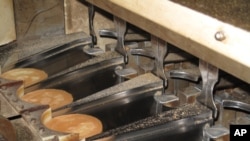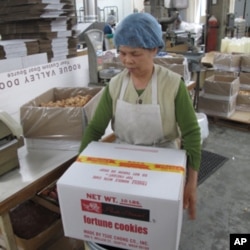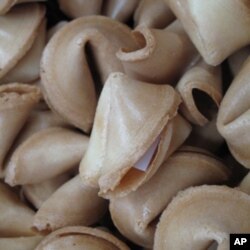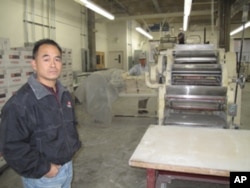The rush begins in the morning at the Tsue Chong factory in Seattle, Washington's International District. Every day, dozens of cars pull up to stock up on the golden brown cookies with a saying inside.
“Customers come in, they double park," says factory owner Tim Louie. "They come in, load up their trucks and take off; not a very long stop, maybe five minutes.”
The business was established in 1917 by Louie's great-grandfather, who emigrated from China.
The company makes most of its money from manufacturing noodles. But what most customers in the area know Tsue Chong for is fortune cookies. You can find them in almost every Chinese restaurant in the neighborhood.
At Jade Garden restaurant, a few blocks down the street, Alan Sidell is enjoying dim sum for lunch. He's been coming to the International District for most of his life, and the fortune cookie factory is an integral part of his neighborhood memories.
“They had a screen door that was open and you could walk down the street and you could watch the fortune cookie machines twirling around, and you saw the attendants placing each fortune into the dough before it was closed up.”
Fortune cookies are a staple at U.S. Chinese restaurants. The wafers are folded around a small slip of paper. The fortunes are pithy, but cryptic, like: "Good things come in invisible packages" and "Accept the next proposition you hear."
No one knows where or when the cookies originated. Some say the idea came from the Chinese who put notes in mooncakes to warn of the Mongolian invasion in the late-13th century. A Japanese scholar cites the city of Kyoto, Japan as the birth place of the fortune cookie. Tim Louie has a hunch they were created in San Francisco.
Whatever their origin, Tsue Chong began baking them in the 1950s. And today, fortune cookies make up a quarter of its business.
The top floor of the factory, where most of the production takes place, is filled mostly with a diversity of noodles, but one corner is devoted to fortune cookies.
First comes the batter, blended in large mixers.
“It starts off with six ingredients. This is my grandma's original recipe," says Louie. "Wheat flour, sugar, vanilla, water, eggs and coconut shortening. And the batter is really thin. It's almost like a pancake or crepe batter.”
Workers carry the batter in buckets to large, round machines.
“There's a tube that goes in there and it siphons it up and pumps it onto round griddles, a couple of tablespoons [about 30 milliliters] per griddle. And as the carousel turns, a lid sets down and flattens and spreads the batter out.”
The batter turns into a mini-pancake. The round cookie is still soft for about 10 seconds, enough time to finish the work. Decades ago, women bakery workers would put the fortunes into the warm cookies and fold them by hand. Today, machines do it.
“The fortunes are all stacked a top of that tray. And by a vacuum, it'll pluck one off the tray and stuff it into the cookie.”
Tsue Chong makes almost 30 million cookies a year.
Louie says the company has been fortunate, despite recent hard economic times.
“I won't say we were recession-proof, but we were able to survive it, where a lot of other business, 35-40 years old, did not survive. So I believe just manufacturing food because people have to eat, we were able to weather the recession.”
Even though restaurant orders were down, supermarkets bought more items from Tsue Chong because more people were eating at home more. But as the business goes forward, Tim Louie says he is not going to leave his company's future to luck.
He plans to make the production process more efficient and wants to improve his fortunes, by moving into new markets along the West Coast.















